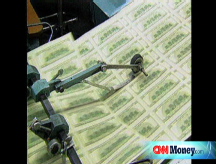Lehman's pep talk rings hollow
The Wall Street giant tells investors that it's taken sufficient steps to reduce risk. A closer look at the numbers tells a different story.
 |
| Lehman Brothers has been hit hard by legitimate questions about its financial strength. |
NEW YORK (Fortune) -- Lehman Brothers yesterday aimed to soothe a frazzled market by announcing a big capital injection, a shrinking balance sheet and improved transparency.
It did not work, to put it mildly. Lehman (LEH, Fortune 500) stock has dropped 15% over two days, and Wall Street finds itself struggling with a pastiche of questions centering on Lehman's credibility and outlook.
For instance, Lehman finance chief Erin Callan used Monday's conference call with analysts and investors to tout the firm's efforts to cut risk by reducing the size of its balance sheet. Callan said Lehman was able to rid itself of $130 billion worth of its assets during the second quarter, in a move she told investors meant that Lehman's deleveraging was complete.
That's fine as far as it goes, but it's worth noting that the big push reversed just three quarters' worth of asset growth. Lehman's balance-sheet slimming act brings the firm's asset base down to $650 billion - on par with its size at the end of last year's third quarter, ended Aug. 31.
In other words, all Lehman has succeeded in doing so far is returning its balance sheet to its size at the beginning of the credit crisis last summer.
Take note, too, that as the credit market storm was gathering strength, Lehman was adding billions upon billions of dollars in assets. Savvy investors would likely be very interested to know what Lehman's top execs saw that led them to vastly expand their balance sheet even as other investors were backing away from risky debt.
In an e-mail, a Lehman Brothers spokesman defended the firm's public statements about its balance sheet. "Our financial disclosures are among the most complete and transparent in the industry," he wrote.
Questions about Lehman's handling of the credit crisis have been building for some time.
Lehman's Callan assured investors and the media in March that a $1.9 billion preferred stock sale "took care of our full-year needs" for funding. But several weeks later, as the rumor mill spun furiously with questions about Lehman's health, the firm raised an additional $4 billion. On Monday, the firm raised another $6 billion.
All told, survival comes at a stiff price: investors might suffer up to 30% dilution, assuming full conversion of the preferred securities into common stock.
The stock issuance also hurt in another way: Lehman bought back 13 million shares over the quarter at an average cost of $59. It sold stock Monday at $28 a share. So Lehman's buybacks effectively cost it $403 million.
To be sure, Lehman's recent buybacks have been a better bargain than the shares it repurchased last year. In 2007, the firm bought back 43 million shares at an average price of $73.85 - paying $3.2 billion for shares that could now be had for just $1.2 billion. The firm has said recently that a large portion of its buybacks have been connected to stock option conversion, but that doesn't make paying a premium price any easier for shareholders to stomach.
Lehman still has some significant things going for it. For one thing, the firm has deep-pocketed investors - including C.V. Starr Chairman Maurice "Hank" Greenberg, who made billions at the helm of AIG (AIG, Fortune 500) - publicly backing its prospects.
The bad news is that Lehman would seem to have few glowing prospects in the short term.
As Fortune.com noted last week, the firm's sharp growth since the 1998 Long Term Capital Management crisis was derived from structured finance, leveraged lending and its work with leveraged buyout shops - three areas where it will likely be years before conditions improve. ![]()
-
 The retail giant tops the Fortune 500 for the second year in a row. Who else made the list? More
The retail giant tops the Fortune 500 for the second year in a row. Who else made the list? More -
 This group of companies is all about social networking to connect with their customers. More
This group of companies is all about social networking to connect with their customers. More -
 The fight over the cholesterol medication is keeping a generic version from hitting the market. More
The fight over the cholesterol medication is keeping a generic version from hitting the market. More -
 Bin Laden may be dead, but the terrorist group he led doesn't need his money. More
Bin Laden may be dead, but the terrorist group he led doesn't need his money. More -
 U.S. real estate might be a mess, but in other parts of the world, home prices are jumping. More
U.S. real estate might be a mess, but in other parts of the world, home prices are jumping. More -
 Libya's output is a fraction of global production, but it's crucial to the nation's economy. More
Libya's output is a fraction of global production, but it's crucial to the nation's economy. More -
 Once rates start to rise, things could get ugly fast for our neighbors to the north. More
Once rates start to rise, things could get ugly fast for our neighbors to the north. More









